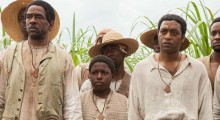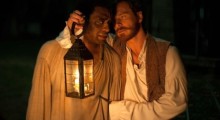Steve McQueen
-
Silences and Explosions: James Harrison and Paul Cotterel on Crafting Blitz‘s Sound

At the beginning of Blitz, London is on fire. Against a night sky striated by German bombs, flames engulf obliterated city streets and brick buildings. A platoon of firemen scramble through dense smoke and charred remains to control an errant water hose, which whips around and knocks one of them unconscious. Within the foggy confusion, their shouts and commands get lost in the unrelenting, roaring soundscape, punctuated by distant air horns, panicked screams and a whistling aerial assault. It’s a blistering sequence, an aural nightmare that sets the mood for a war movie full of unexpected, terror-filled situations. Normally, sound […]
by Jake Kring-Schreifels on Dec 16, 2024 -
“Sometimes the Present Erases the Past, and Sometimes the Past Erases the Present”: Steve McQueen on His Cannes-Premiering Occupied City

Tourists in Amsterdam typically stop at the Anne Frank House, but the ever-moving conga line of visitors tends to work against reflecting on the reality of its rooms. Steve McQueen’s Occupied City opens up a space for contemplation of a hundred-plus houses, buildings, and other sites across Amsterdam that are marked by World War II and the Holocaust in some way, tracing scars and trauma that may no longer be visible, much less widely known. Informed by an illustrated book by McQueen’s partner, Bianca Stigter (who directed Three Minutes: A Lengthening), it’s a living atlas: scenes of pandemic-era Amsterdam, overlaid […]
by Nicolas Rapold on May 25, 2023 -
Cannes 2023: Occupied City

Cannes Film Festival director Thierry Frémaux is not good at playing defense. When asked at Monday’s pre-opening day press conference about an open letter published by (retired) actress Adèle Haenel accusing the festival of protecting “its rapist chiefs,” among them Roman Polanski and Gérard Depardieu, Frémaux responded that “if you thought that it’s a festival for rapists, you wouldn’t be here listening to me, you would not be complaining that you can’t get tickets to get into screenings.” “Festival for rapists” is a clunkily phrased self-own for Frémaux and his subsequent leap to ticketing problems is equally ungainly—but the access problems […]
by Vadim Rizov on May 17, 2023 -
The Great Escape, “Tell Me” on Criterion Channel, and More: Jim Hemphill’s Home Video Recommendations

The Great Escape was a dream project for director John Sturges for years before the success of The Magnificent Seven finally enabled him to make it in 1962, and the countless hours he spent thinking about and planning the WWII epic are evident in every flawless shot. The true story of a group of Allied officers who plan and execute a daring escape from a Nazi POW camp, The Great Escape is an exhilarating celebration of ingenuity and skill by a director who honors his characters with some awfully impressive skill of his own. The movie is 172 minutes but […]
by Jim Hemphill on May 24, 2020 -
Editor Joe Walker on Cutting Steve McQueen’s Widows

“A stroke, and then a slap,” says editor Joe Walker. That’s how director Steve McQueen described the tone he wanted in the opening scenes of Widows. The movie opens with a remarkable sequence, intercutting glimpses of the main characters’ family lives with images from a horrifically bloody heist gone wrong — showing, in effect, how four of the women at the heart of the film become widows. So, for example, we see Viola Davis’s Veronica Rawlings passionately kissing her husband Harry (Liam Neeson) and then suddenly we’re in the back of Harry’s van as police fire on it. We see […]
by Bilge Ebiri on Dec 20, 2018 -
Filmmaker‘s Look at the Below-the-Line Stars of Some of the Awards Season’s Best Films

Movies aren’t just willed into existence, however much Alfred Hitchcock might have wanted them to be. We love to talk about visionary directors, but we often fail to properly acknowledge the artists, craftspeople and technicians who make their works possible. Luckily, many of these individuals — the below-the-line talent, as they’re sometimes called — receive some recognition during awards season, particularly from the guilds and, ultimately, the Oscars. And those who look at the late-year awards rush only through the lens of who’s going to win the big prizes — picture, director, performance, etc. — risk missing out on some […]
by Bilge Ebiri on Dec 17, 2018 -
TIFF Critic’s Notebook 4: Widows

The first shot of Steve McQueen’s Widows is in keeping with the Master Shot Severity of Hunger, Shame and 12 Years a Slave: an overhead two-shot of Veronica (Viola Davis) and Harry Rawlins (Liam Neeson) in bed, held at great length, allowing for durational “naturalistic” acting in a rigorously defined space. “Severity” is descriptive, not necessarily a pejorative: the solemn Steadicam virtuosities and meticulously imprisoning static compositions of Shame only heightened the silliness of the story of a rich man who does zero work onscreen while having sex with an effortlessly accrued slew of partners but who, like Brian Wilson, sometimes still feels Very Sad. McQueen’s […]
by Vadim Rizov on Sep 9, 2018 -
Steve McQueen’s Latest Film? A (NSFW) Burberry Ad Shot in 70mm

Director Steve McQueen hasn’t made another feature since winning an Academy Award for Best Picture for Twelve Years a Slave in 2014. He had been plugging away on the new HBO series Codes of Conduct, which the pay cable network described as Six Degrees of Separation meets Shame. But despite a cast including Paul Dano, Helena Bonham Carter and Rebecca Hall, HBO scrapped the project after initially giving it a six-episode order. But McQueen has kept busy with short film projects including All Day, a 9-minute video installation featuring Kanye West. Of course, he’s no stranger to the short film format, having made some 20 short films since he was an […]
by Paula Bernstein on Apr 7, 2016 -
NYFF Critic’s Notebook: 12 Years A Slave, Blue Is The Warmest Color, Like Father, Like Son

A substantial majority of the New York Film Festival slate is traditionally reserved for established auteurs and big-buzz festival titles. It might be better for adventurous film culture if NYFF and Cannes were to ditch the ballast of already established directors in favor of new and uncharted terrain, but that’s simply never going to happen and to protest otherwise is an unrealistic waste of time. (For those in the press corps, it’s also fun to bang through a dozen of the Year’s Most Important Releases in rapid sequence.) The U.S. premiere of Steve McQueen’s much-praised 12 Years A Slave may have […]
by Vadim Rizov on Oct 17, 2013 -
Screenwriter John Ridley Talks 12 Years a Slave

12 Years a Slave — the title of Steve McQueen’s latest, taken from its source material, the Solomon Northup memoir — is one of the most direct and descriptive of recent cinema history. But consider further the subtitle of Northup’s 1853 book: “Narrative of Solomon Northup, a citizen of New-York, kidnapped in Washington city in 1841, and rescued in 1853, from a cotton plantation near the Red River in Louisiana.” It’s one of the film’s extraordinary achievements that, as it lands in theaters nationwide with the headwinds of an Oscar frontrunner, it tells, on its most basic level, that story. […]
by Scott Macaulay on Oct 16, 2013
